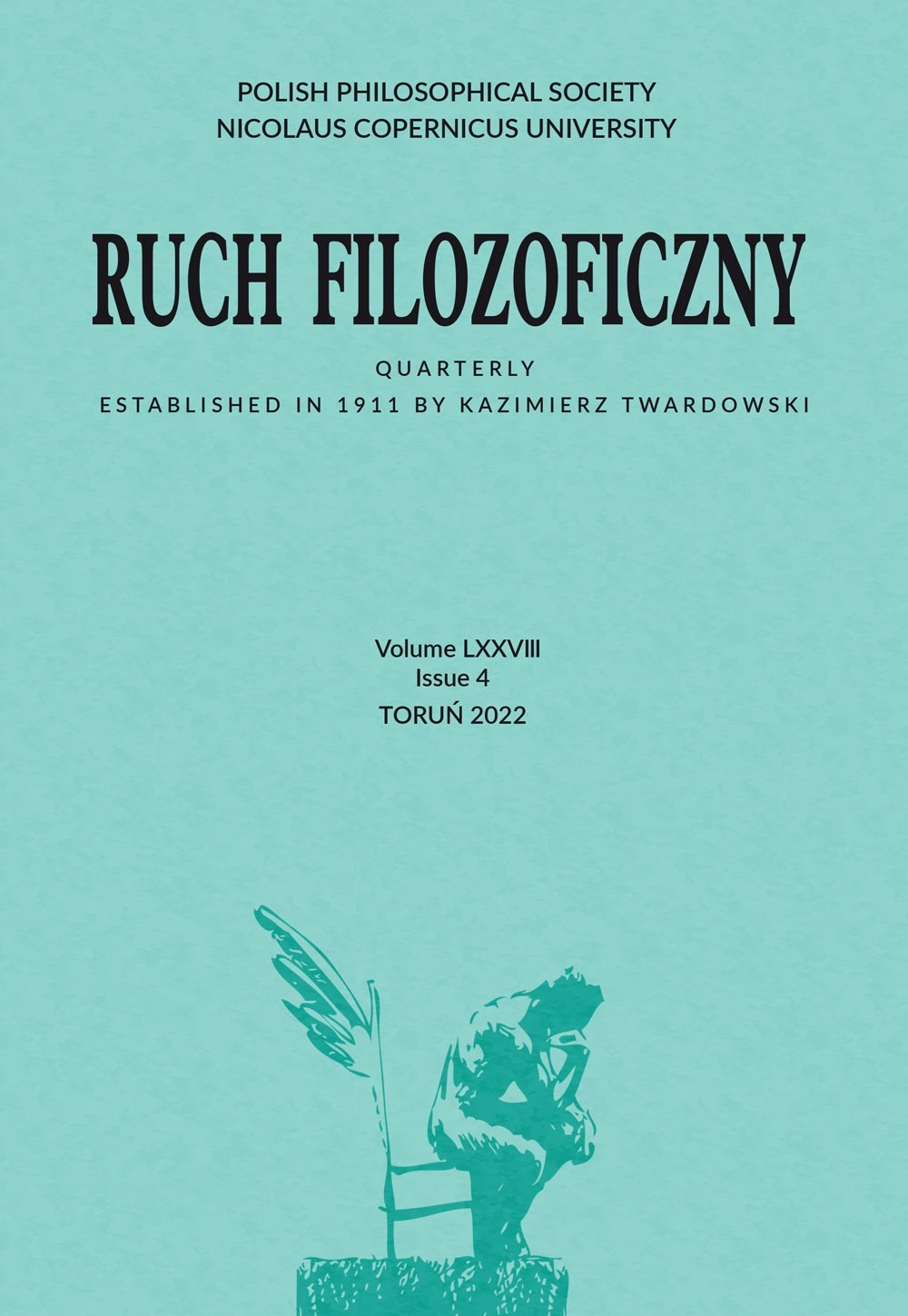Identity, Dignity and the Politics of Resentment
DOI:
https://doi.org/10.12775/RF.2022.034Keywords
identity politics, human dignity, Francis Fukuyama, George Packer, globalization, liberal democracy, democratic accountability, nationalism, factionalism, vetocracyAbstract
In his 2018 book, Identity, the Demand for Dignity and the Politics of Resentment, Stanford University political scientist Francis Fukuyama addresses themes which might more properly be considered matters of political philosophy and the philosophy of law: How are we to navigate between traditional, ethnic, unitary conceptions of the nation on the one hand, and the threat of identitarian fragmentation on the other? Though Fukuyama affirms the importance of the concepts of human dignity and identity, more or less as these are commonly understood, he also criticizes the contemporary phenomenon of identity politics—which he views as a danger to liberal democracy. “The rise of identity politics in modern liberal democracies,” writes Fukuyama, “is one of the chief threats that they face;” and moreover, “unless we can work our way back to more universal understandings of human dignity, we will doom ourselves to continuing conflict.” This paper raises the question of whether the well reasoned case against identity politics as a threat to national unity and purpose leaves room for skepticism of fast-paced and more ambitious (“Wilsonian”) pursuit of internationalist goals of globalization. Greater emphasis on political consensus at home may helpfully strengthen the hand of American foreign policy in support of liberal democracy. But we now look back with well founded skepticism on neo-conservative interventionism, and there are just and needed limits on globalizing internationalism imposed by and implicit in the retreat from identity politics. Having lost the unity of purpose of Cold War liberalism, we are yet to find a “golden mean” avoiding ethnic nationalism and short of political fragmentation.
References
Boisvert Raymond. 1998. John Dewey: Rethinking our Time. Albany, NY: State University of New York Press.
Callaway H. G. 2008. William James, A Pluralistic Universe. Newcastle, UK: Cambridge Scholars.
Callaway H. G. 2017. “Pragmatic Pluralism and American Democracy.” In: H. G. Callaway, Pluralism, Pragmatism and American Democracy: A Minority Report, 47–74. Newcastle, UK: Cambridge Scholars.
European Union Agency for Fundamental Rights. 2000. “Charter of Fundamental Rights of the European Union.” Official Journal of the European Communities C 364,18.12: 1–22.
Fukuyama Francis. 1989. “The End of History?” The National Interest (Summer Issue): 3–18.
Fukuyama Francis. 1992. The End of History and the Last Man. New York: The Free Press; Simon and Schuster.
Fukuyama Francis. 2006. America at the Crossroads, Democracy, Power and the Neo-con-servative Legacy. New Haven, CT: Yale University Press.
Fukuyama Francis. 2011. The Origins of Political Order. New York: Farrar, Straus and Giroux.
Fukuyama Francis. 2014. Political Order and Political Decay. New York: Farrar, Straus and Giroux.
Galston William A. 2021. “The Bitter Heartland.” American Purpose (March 31 Issue).
Gutmann Amy. 1998. “Introductory Essay.” In: Freedom of Association, ed. Amy Gutmann, , 3–32. Princeton, NJ: Princeton University Press.
Huntington Samuel. 2004. Who Are We? The Challenges to America’s National Identity. New York: Simon and Schuster.
Kommers Donald P. 1975. The Constitutional Jurisprudence of the Federal Republic of Germany. 1997, 2nd ed. Durham, NC & London: Duke University Press.
Kymlica Will. 1998. “Ethnic Associations and Democratic Citizenship.” In: Freedom of Association, ed. Amy Gutmann, 177–213. Princeton: Princeton University Press.
Lincoln Abraham. 1858. “Speech at the Illinois Republican Convention, Springfield Illinois, June 16, 1858,” reprinted in Neely, Mark E. Jr. 1982. The Abraham Lincoln Encyclopedia. New York: Da Capo Press.
Madison James. 1787. Federalist Papers, No. 10. “The Same Subject Contin¬ued, The Union as Safe¬guard against Domestic Faction And Insur¬rec¬tion.” In: The Federalist. Earle, E. M. Intro. 53–61. New York: Random House.
McCrudden Christopher. 2008. “Human Dignity and Judicial Interpretation of Human Rights.” The European Journal of International Law 19(4): 655–724.
Packer George. 2021. Last Best Hope, America in Crisis and Renewal. New York: Farrar, Straus and Giroux.
Packer George. 2021. “The Four Americas, How America Fractured into Four Parts.” The Atlantic (July–August Issue): 65–78.
Rao Neomi. 2008. “On the Use and Abuse of Dignity in Constitutional Law.” Columbia Journal of European Law 14: 201–254.
Roosevelt Theodore. 1915. “Columbus Day Speech to the Knights of Columbus, at Carnegie Hall, October 12, 1915.” In: Philip Davis. 1920, 645–660. Immigration and Naturalization: Selected Readings. Boston–New York: Ginn and Co.
Ryan Alan. 1995. John Dewey and the High Tide of American Liber¬alism. New York– London: Norton.
Schlesinger Arthur, Jr. 1991. The Disuniting of America, Reflec¬tions on a Multi¬cultural Society. New York–London: W. W. Norton.
Taylor Charles. 1994. “Multiculturalism and the Politics of Recognition.” In: Multiculturalism and the Politics of Recognition, ed. Amy Gutmann. Princeton, NJ: Princeton University Press.
Taylor Charles. 1997. “Nationalism and Modernity.” In: The Morality of Nationalism, ed. Jeff McMahan, Robert McKim. New York: Oxford University Press.
Walzer Michael. 1996. What it Means to be an American. New York: Marsilio.
Wood Gordon S. 2021. Power and Liberty, Constitutionalism in the American Revolution. New York–Oxford: Oxford University Press.
CASES CITED:
Federal Republic of Germany
Abortion Case 1, 39 BverfGE 1 (1975).
Abortion Case 2, 88 BverfGE 203 (1993).
United States
Bush v. Gore, 531 U.S. 98 (2000).
Citizens United v. Federal Election Commission, 558 U.S. 310 (2010).
Griswold v. Connecticut, 381 U.S. 479 (1965).
Lawrence v. Texas 539 U.S. 558 (2003).
Planned Parenthood of Southeastern Pennsylvania v. Casey, 505 U.S. 833 (1992).
Roe v. Wade, 410 U.S. 113 (1973).
Dobbs v. Jackson Women’s Health Organization, 597 U.S. 19-1392 (2022).
Downloads
Published
How to Cite
Issue
Section
License
Copyright (c) 2023 Howard G Callaway

This work is licensed under a Creative Commons Attribution-NoDerivatives 4.0 International License.
Stats
Number of views and downloads: 1068
Number of citations: 0



